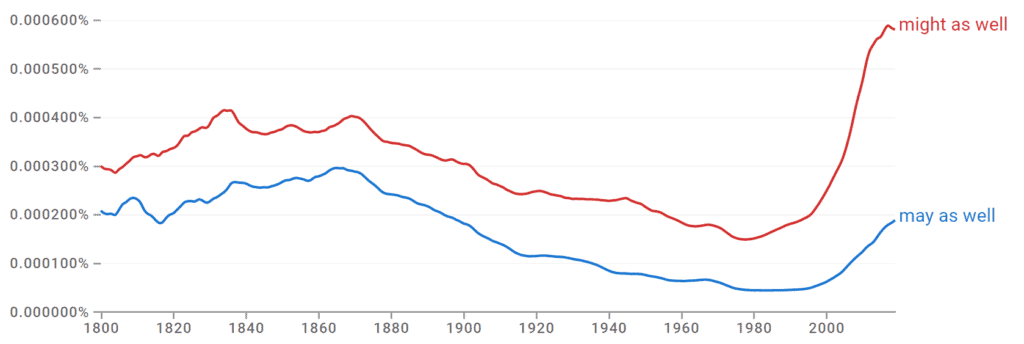Might as well is a phrase with a history steeped in a proverbial lesson concerning the avoidance of a particular crime. The legal implications of the phrase have been lost throughout history, and today, it is commonly used to express a lack of enthusiasm when approaching a task or to do something since there is no reason not to do it.
Let’s take a closer look at the meaning behind this term and how you can properly use it in your own material.
What Is the Meaning of Might as Well?

Might as well is an informal phrase used to express a few different scenarios. It is most often used to express the sentiment that one should do something because there is no reason not to or to indicate that it is probably better to do something than not do it.
For example:
- I know your essay wasn’t turned in on time, but you might as well submit it, and hope the instructor accepts the effort you put into it.
- You might as well follow up on that interview; it can’t hurt to see if the company has decided yet.
It is also a phrase used when one suggests that one is not entirely enthusiastic about.
For example:
- I know you don’t want to go to the movies with them, but you might as well show up to avoid a scene later.
- “I might as well leave then,” she said as she glanced up at her mother’s angry face, “but for the record, I REALLY do not want to be at this birthday party.”
Might as well is also used to compare the equality of a given situation to a hypothetical situation.
For example:
- The rental car parking might as well be in the next city due to its insane distance from the airport it services.
- Despite the instructor coming from one of the most prestigious universities to lecture, he might as well be one of the students, given his lack of knowledge whenever asked a question in class.
Is It May as Well or Might as Well?

There is some confusion and, understandably, some controversy over whether you should use might as well or may as well. Despite your preference, the phrases are interchangeable, and both mean the same thing. Because the term is informal, there are no hard and fast grammar rules you must follow when using either option.
Most people prefer one over the other despite might as well being the more popular choice.
Might as Well Origins
The origin of might as well seems to be influenced by a British law that goes as far back as the 17th century and likely is even older. The law is first mentioned in John Ray’s English Proverbs of 1678, in which the idiom “As good be hang’d for an old sheep as a young lamb” appears.
This proverbial phrase was well known as “one might as well be hanged for a sheep as a lamb” under British law, in which a guilty party could be hanged for stealing goods worth more than a shilling. Under these pretenses, if you were going to steal a lamb, you might as well take the adult instead since the punishment would be the same either way if caught.
This law was reformed in 1820, during which the death penalty was thrown out, and other less harsh penalties took the place of hanging.
Today, the second half of the phrase concerning the theft of a sheep (or goat in some scenarios) has been dropped but might as well continues to be used in informal speech patterns to indicate
Let’s Review
Might as well has an interesting history related to thievery. But today, the phrase is commonly used to mean you should do something since there is no reason not to do it.
Enjoyed reading about phrases? Check out some others we covered:
